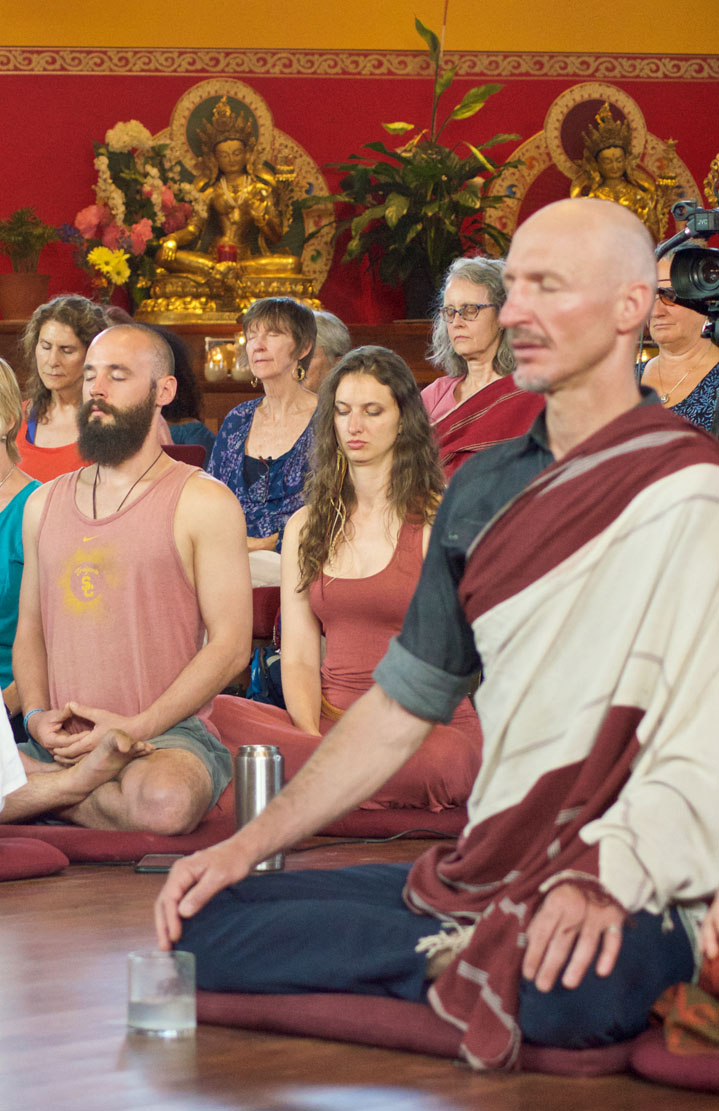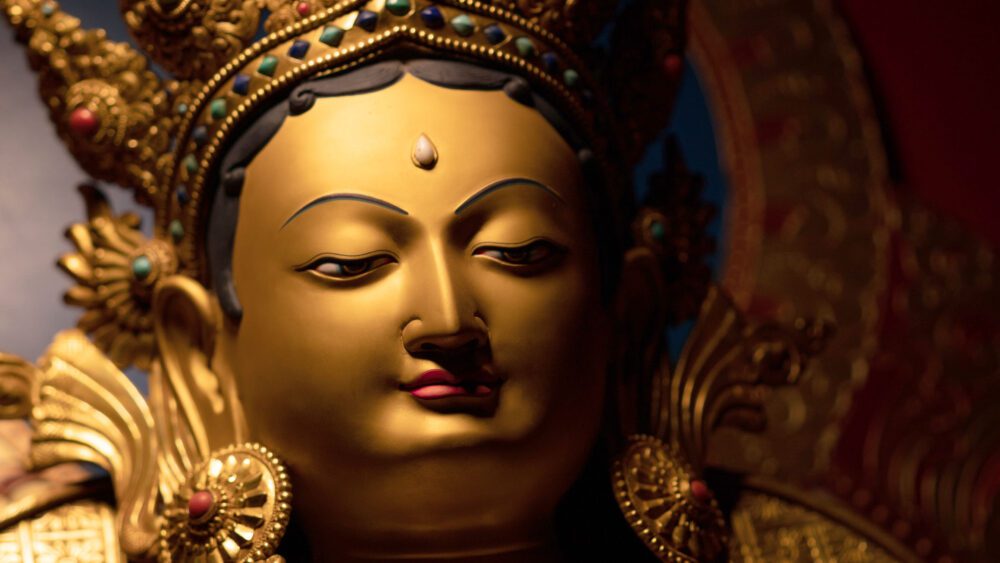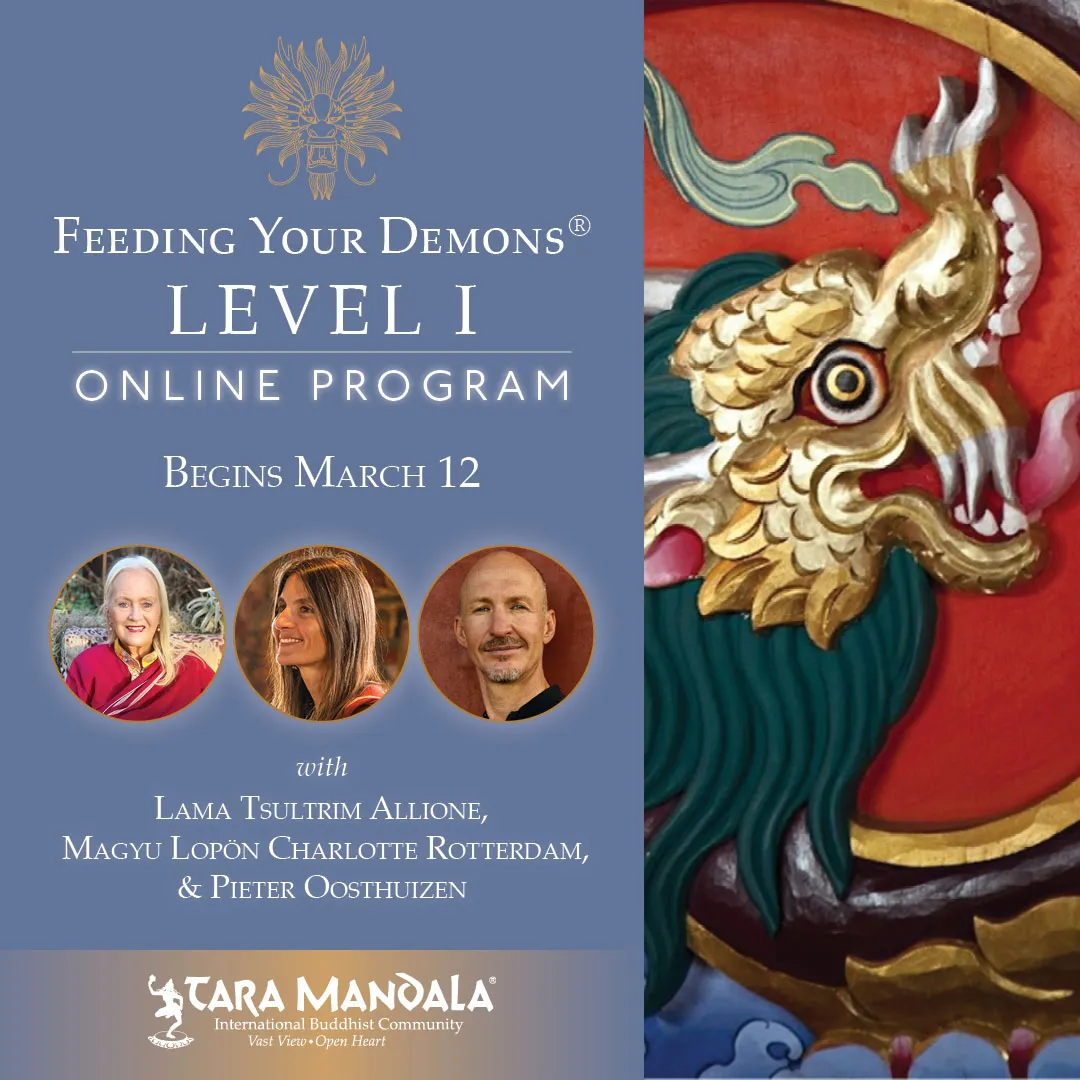By Lopön Pieter Oosthuizen
“Taking it in its deepest sense, the shadow is the invisible saurian tail that man still drags behind him. Carefully amputated, it becomes the healing serpent of the mysteries. Only monkeys parade with it.”
– Carl Jung “The Integration of the Personality” (1939).
Avoidance and the Suffering of Avoidance
We humans seem to come pre-programmed with a primeval fear of negativity.
We are so deeply conditioned to turn away from what we sense or perceive as negative, uncomfortable, painful, or unpleasant that we mostly do it automatically. Ironically, the avoidance itself is often very uncomfortable. It seldom leads to a sunny disposition, instead depositing us in the borderlands around our shadows.
So how to deal with this? The advice we have been getting for decades from people like Carl Jung and many others is to turn towards our shadow, to turn into the unpleasant, to feed our demons, to basically embrace the suck.
But even though we know this, and even if we practice this, we still tend to deal with shadow only on an occasional basis – usually when it can no longer be avoided. Feeding Your Demons is a practice which encourages a deep engagement with our shadow, and provides effective tools to do just that. I have been working with and teaching this process for years now, and yet I am still susceptible to the knee-jerk avoidance impulse whenever I feel a negative emotion arise. I would only deal with these perceived debilitating thoughts and emotions occasionally by inviting them in during a scheduled practice or process, or when they become too overwhelming to ignore. And even when we do turn to face our demons, we still tend to approach them from the side of the ‘light’: from a base assumption that our disposition should fundamentally be happy and light. So we hold our nose and deal with the repugnant shadow just in order to ‘process’ it, ‘work through’ it, or transform it and come back to our rightful place in the sun.

In this regard Carl Jung says: “Filling the conscious mind with ideal conceptions is a characteristic of Western theosophy, but not the confrontation with the shadow and the world of darkness. One does not become enlightened by imagining figures of light, but by making the darkness conscious”.
If there really is a non-dual awareness beyond the daily experience of duality, simple alchemical logic will have us commingle equal parts of light and dark and embrace the entire mandala of manifestation – no preference – in order to transcend the limitations of each. And yet we avoid contact with the dark at all costs.
The Practice
So how to work with it? By bringing mindfulness to the avoidance impulse itself, whenever it surfaces. It may then serve as a flag post, a helpful marker to call our attention to a previously unconscious avoidance maneuver in progress. And once we are aware of it, what do we do? We intentionally turn into the full experience of emotion we were trying to avoid in the first place. We just really feel what it feels like. We focus not on the fear and resistance around the feelings, and not on the narrative we’ve built up around it, but on the actual somatic felt sense of it. We try to tune into what it feels like in the body, simply experiencing the sensations engendered by it. We open to it, we accept it. It is valid and real inasmuch as it had arisen. Suppressing it would not make it less real. Or more precisely, suppressing it would make suppression and avoidance real for us, which is arguably even worse.
Transactionally, the payback is much higher on turning into what is actually arising, rather than replacing it with avoidance. The primary benefit of avoidance or suppression is expediency, like when we push emotions aside in order to efficiently deal with a crisis. But when it becomes habit the benefits decline precipitously. On the other hand, turning into whatever emotion is arising has many potential benefits.

The Benefits of the Practice
Makes you feel courageous, a little heroic:
This relates to the warrior spirit, to you showing up in your life, to be inspired by your own courage.
Tames fear:
If you are willing to turn into anything as it arises, you become less afraid. You start to be liberated from the postures of avoidance, defensiveness, and resistance. Come what may.
Openness and spaciousness:
By turning towards your demons and accepting them as they arise you cultivate an attitude of allowance and openness – the space for all to arise without preference. Freedom from constriction and avoidance.
In conclusion, here are the words of the great Chögyam Trungpa Rinpoche:
“Most of the problems in life do not come so much because you are an aggressive or lustful person. The greatest problem is that you want to bottle those things up and put them aside, and you have become an expert in deception. That is one of the biggest problems. Meditation practice is supposed to uncover any attempts to develop a subtle, sophisticated, deceptive approach. It is to uncover those patches.”
This post was written by Lopön Pieter Oosthuizen, and is posted here with permission.
Lama Tsultrim Allione, Dorje Lopön Charlotte Rotterdam and Lopön Pieter Oosthuizen offer the Feeding Your Demons® Online Program, Level I, beginning August 30. To learn more, read below.
Feeding Your Demons® Level I
With Lama Tsultrim Allione, Magyu Dorje Lopön Charlotte Rotterdam, and Lopön Pieter Oosthuizen • Begins August 30
Begin your journey learning this potent, life-changing method, creating meaningful transformation in a world that is ripe for profound healing. Choose between the Buddhist or Secular tracks …
Level I (Buddhist Track) – Learn more »
Level I (Secular Track) – Learn more »
Feeding Your Demons®: Kapala Training Level I (Retreat in Colorado)
With Lopön Karla Jackson-Brewer, M.S. and Lopön Polly Ryan, MA, MFT • August 25 – 31
Enjoy the beautiful land in Colorado, as you embark on your Feeding Your Demons journey. For those who wish to acquire an effective methodology to directly engage with their own habitual patterns, challenges, and obstacles for sustained transformation, and also for mental health professionals, life coaches, substance abuse or guidance counselors, spiritual mentors, social workers, or anyone who wishes to eventually become certified to use this method to help and empower others … Read more »
About Lopön Pieter Oosthuizen
Lopön Pieter Oosthuizen is a teacher and entrepreneur and a long-time student of Tibetan Buddhism. He has been teaching various practices and retreats in Lama Tsultrim’s lineage in the US and abroad since 2006, offering a blend of incisive insight and genuine compassion. He co-leads the Boulder Tara Mandala Sangha with Dorje Lopön Charlotte Rotterdam, and formerly served as the President of the Tara Mandala Board. … Read more »







